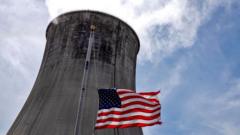China's latest tariffs come as a direct response to President Trump's recent 10% tax on all Chinese imports. The announced tariffs include a 15% tax specifically on U.S. coal and liquefied natural gas, with crude oil and various automobiles also facing a 10% tariff. China has voiced its concerns to the World Trade Organization, arguing that the U.S. actions breach international trade rules.
The U.S. administration has defended its tariffs, citing trade deficits and a push to address the opioid crisis linked to fentanyl imports from China. In light of these tensions, China has accused the U.S. of exacerbating problems rather than fostering cooperation. The new tariffs are set to impact a wide range of goods beyond energy, including agricultural equipment and specific vehicle types.
China's retaliation also includes placing more U.S. firms on its "unreliable entity" list, targeting companies such as PHV Corp and Illumina for discriminatory practices against Chinese businesses. Companies listed could face sanctions, including fines and restrictions on foreign employee work visas.
Furthermore, to bolster its economic strategy, China has declared plans to restrict the export of 25 crucial minerals necessary for technology and manufacturing, affecting industries reliant on these resources.
On a different front, China is investigating Google over potential antitrust violations, despite the company's search services being blocked in its territory since 2010. The ongoing trade conflict has seen both nations levying tariffs on hundred of billions in goods in recent months.
Meanwhile, President Trump has temporarily suspended planned tariffs on Mexico and Canada as negotiations over border security and fentanyl trafficking continue. The future of these tariffs remains uncertain, which could lead to businesses reconsidering their dependency on U.S. markets amidst increasing trade tensions.
The U.S. administration has defended its tariffs, citing trade deficits and a push to address the opioid crisis linked to fentanyl imports from China. In light of these tensions, China has accused the U.S. of exacerbating problems rather than fostering cooperation. The new tariffs are set to impact a wide range of goods beyond energy, including agricultural equipment and specific vehicle types.
China's retaliation also includes placing more U.S. firms on its "unreliable entity" list, targeting companies such as PHV Corp and Illumina for discriminatory practices against Chinese businesses. Companies listed could face sanctions, including fines and restrictions on foreign employee work visas.
Furthermore, to bolster its economic strategy, China has declared plans to restrict the export of 25 crucial minerals necessary for technology and manufacturing, affecting industries reliant on these resources.
On a different front, China is investigating Google over potential antitrust violations, despite the company's search services being blocked in its territory since 2010. The ongoing trade conflict has seen both nations levying tariffs on hundred of billions in goods in recent months.
Meanwhile, President Trump has temporarily suspended planned tariffs on Mexico and Canada as negotiations over border security and fentanyl trafficking continue. The future of these tariffs remains uncertain, which could lead to businesses reconsidering their dependency on U.S. markets amidst increasing trade tensions.






















